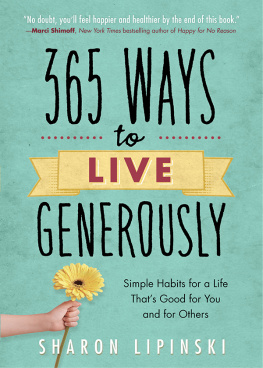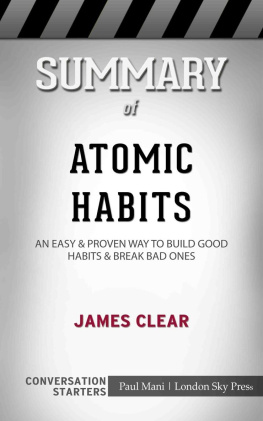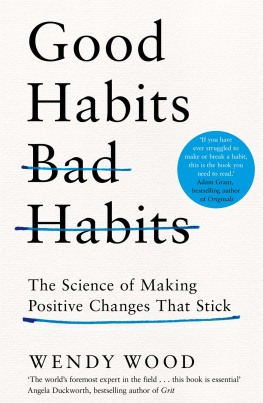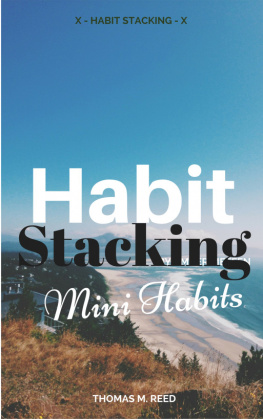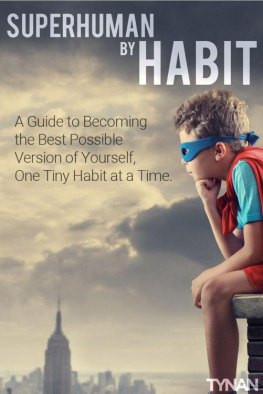Boost:
Create Good Habits Using Psychology and Technology
By Max Ogles
This book includes an app guide titled
117 Apps to Help You Create Good Habits, which you can download for FREE at http;//www.maxogles.com/exclusive .
Boost: Create Good Habits Using Psychology and Technology
Copyright 2014 by Max Ogles.
All rights reserved. No part of this publication may be reproduced, distributed, or transmitted in any form or by any means without the prior written permission of the publisher, except in the case of brief quotations embodied in critical reviews and certain other noncommercial uses permitted by copyright law.
For permission requests, contact Max Ogles using the contact forms that can be found at www.maxogles.com .
Short sections of this book have appeared in slightly different form in The Huffington Post, Business Insider, The Next Web, MaxOgles.com, and NirandFar.com.
Disclaimer
While the information in this book has been verified for accuracy by the author, the author/publisher does not assume any responsibility for errors, omissions, or contrary interpretations of the subject matter herein. Any perceived slight of any individual or organization is purely unintentional.
This book is for entertainment purposes only and the author/publisher is not engaged to render any type of psychological, legal, or any other kind of professional advice. The author/publisher shall not be liable for any physical, psychological, emotional, financial, or commercial damages. The reader is responsible for his or her own actions.
Topics include: habit, habits, good habits, bad habits, breaking habits, healthy habits, changing habits, and behavioral psychology.
Your Free App Guide
First, thank you for reading my book. While we may not know each other personally, Im sure we have many things in common, particularly that were both motivated to improve ourselves and create good habits. As Ive worked to improve myself, Ive found it helpful to use apps and other online programs as tools for tracking my goals, finding motivation, and interacting with others who share the same goals as me.
There are thousands of apps that can help us create good habits, and thats a good thing; we all have unique personalities, and a variety of different tools will help us succeed. The more options we have to choose from, the more likely we are to find things that work for us. To help you decide which apps or technologies youd like to try, I created a guide that will introduce you to some of the best habit-forming apps that are available.
As a thank you for purchasing my book, Id like to give you this useful guide for free. Its called, 117 Apps to Help You Create Good Habits.

Go to http://www.maxogles.com/exclusive to download the complete guide for free.
Table of Contents
Part 1: How to Start New Habits
Part 2: How to Make Habits Last
Introduction
Not long ago, I had a conversation with my mom about some impressive new technology for developing good habits. My mom is fairly tech-savvy and knows Im into habit-forming technology, so she made a point of mentioning the new wearable that she had seen. I was already familiar with the device she was excited about, the latest version of Fitbit. A Fitbit is a small device that you wear throughout the day to track important health metrics, such as number of steps, calories burned, and sleep quality.
Though I dont own a Fitbit, Ive read a decent number of reviews about it and talked with my friends who use it. Well, I told my mom, it does track some useful data, but the real problem is that most people cant seem to stick with it for more than a few months. (This is true about Fitbit, along with most other health technology devicesmost people give up on health technology after just a few months.) Then my mom made an interesting point: Oh, sure, youre probably right, but I dont really mind. If it helps motivate me to be healthy for a few months, thats greatthen Ill just move on and try something else. Im always looking for new things to try, and Im always trying to be healthy, so that works fine for me.
At first, what my mom said didnt make sense. Why would you want a device that doesnt ultimately solve the problem youre targeting when you know that youll just give it up in a few months? Over time, though, Ive come to understand better what she meant. Most people will spend their entire lives trying to be healthy, because they know that it helps them feel good, be happier, and live longer lives. The quest for a healthy life never ends; just because theyre healthy today does not mean they can stop everything and live healthily ever after. Even extremely healthy individuals have to keep up their motivation and good habits to maintain the lifestyle that theyve worked hard to achieve.
The same lesson applies broadly to all areas of improvement in your life. You can spend your entire life, working to be a better person, developing skills and habits to become a new version of yourself. Books, tools, coaches, and other resources that promise to make you perfect in one area of your life cannot be true; you will always have room for improvement.
As a writer, I had doubts about writing a book about personal improvement because I know that I have plenty to improve myself. But the intent of this book isnt to solve all of your (and my) problems. The truth is that we will read many books in our lives, including great ones like 7 Habits of Highly Effective People by Stephen Covey or The Power of Habit by Charles Duhigg. We will learn new ideas and interesting principles, but we will still have plenty of room for improvement. No single book can solve our problems and thats why we keep reading. This book is written to help us improve ourselves, even just a little, to help us maintain an upward trajectory as we constantly work to be better.
Ive worked hard to make this book meaningful, but it is not definitive or comprehensive; it should be used along with many other resources you find as you work to create good habits. I collected a variety of different ideas and opinions about habits and tried to illustrate these principles with research and stories. Rather than have intrusive in-text citations or footnotes, I have listed all the sources for my research and stories in a notes section with just simple superscript numbers in the text. Reading the research and stories is informative and inspiring, but personal change still requires diligent application, experimentation, research, and persistence.
Broadly, the book will discuss two themes, psychology and technology, and what Ive learned about using them separately and in conjunction with each other to create good habits. Ill offer a brief introduction to each theme here, and youll see them as the prominent themes throughout the book.
Add Some Psychology
I dont know that Ive ever met a person who strongly dislikes psychology. There may be some people who hate psychologyan undergraduate student jaded by a particularly boring psych 101 class, or a disciple of the hard sciences who dismisses the worth of soft psychologybut generally, as a society, we seem to be obsessed with it. Thats because trying to understand ourselves is a fascinating process. Psychology helps us understand why we make stupid decisions, why other people make stupid decisions that affect us, and why we arent 100% logical and rational all of the time. In a way, psychology is entirely a discipline of self-improvement; it helps us analyze our thoughts, actions, and motivations to learn how we can avoid misjudgments.
In self-improvement, psychology helps us step outside of ourselves and view our thoughts and actions from a third-person perspective. This perspective, an outside view of ourselves, is essential to making progress. I learned once that there are people who act, and people who are acted upon, meaning that some people control the trajectory of their lives (
Next page

